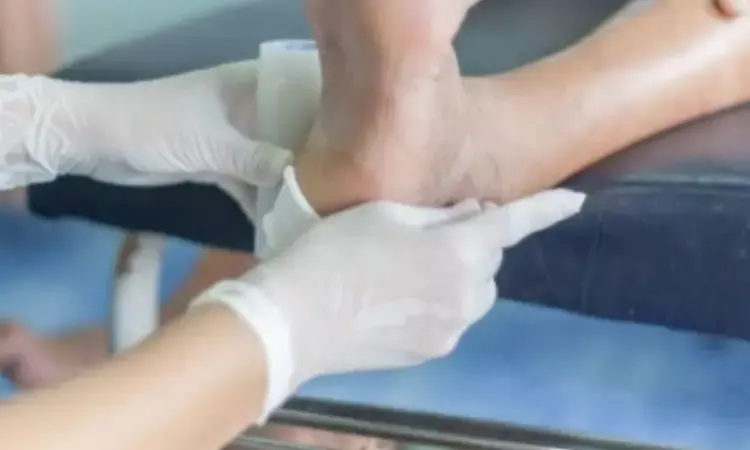- Home
- Medical news & Guidelines
- Anesthesiology
- Cardiology and CTVS
- Critical Care
- Dentistry
- Dermatology
- Diabetes and Endocrinology
- ENT
- Gastroenterology
- Medicine
- Nephrology
- Neurology
- Obstretics-Gynaecology
- Oncology
- Ophthalmology
- Orthopaedics
- Pediatrics-Neonatology
- Psychiatry
- Pulmonology
- Radiology
- Surgery
- Urology
- Laboratory Medicine
- Diet
- Nursing
- Paramedical
- Physiotherapy
- Health news
- Fact Check
- Bone Health Fact Check
- Brain Health Fact Check
- Cancer Related Fact Check
- Child Care Fact Check
- Dental and oral health fact check
- Diabetes and metabolic health fact check
- Diet and Nutrition Fact Check
- Eye and ENT Care Fact Check
- Fitness fact check
- Gut health fact check
- Heart health fact check
- Kidney health fact check
- Medical education fact check
- Men's health fact check
- Respiratory fact check
- Skin and hair care fact check
- Vaccine and Immunization fact check
- Women's health fact check
- AYUSH
- State News
- Andaman and Nicobar Islands
- Andhra Pradesh
- Arunachal Pradesh
- Assam
- Bihar
- Chandigarh
- Chattisgarh
- Dadra and Nagar Haveli
- Daman and Diu
- Delhi
- Goa
- Gujarat
- Haryana
- Himachal Pradesh
- Jammu & Kashmir
- Jharkhand
- Karnataka
- Kerala
- Ladakh
- Lakshadweep
- Madhya Pradesh
- Maharashtra
- Manipur
- Meghalaya
- Mizoram
- Nagaland
- Odisha
- Puducherry
- Punjab
- Rajasthan
- Sikkim
- Tamil Nadu
- Telangana
- Tripura
- Uttar Pradesh
- Uttrakhand
- West Bengal
- Medical Education
- Industry
Inadequate folate intake tissue impairs repair process in diabetic foot ulcer: Study

Australia: A lack of adequate folate may negatively impact healing in patients with diabetic foot ulcers, suggests a recent study published in the Journal of Human Nutrition and Dietetics. This implies that wound management of people with diabetic foot ulceration (DFU) should include a regular assessment of dietary intake in order to recognize deficiencies in macro-and micronutrients. Addressing these inadequacies may help to optimize healing.
Individuals with DFU are required to take adequate nutrition, therefore, an assessment of dietary intake is critical. A lack of proper intake of nutrients including protein, zinc, and vitamins C and D have all been related to poor wound healing. However, the comprehensive dietary intake of Australian adults with DFU is poorly understood. Peta Ellen Tehan, University of Newcastle, Callaghan, NSW, Australia, and colleagues, therefore, aimed to describe the dietary intake of adults with DFU in an Australian setting in a cross-sectional study.
For this purpose, the researchers recruited participants (n = 115) with diabetes (type 1 and 2), a mean body mass index of 36, and current foot ulceration from across New South Wales, Australia. Using Australian Eating Survey, a self-reported validated food frequency questionnaire, dietary intake was assessed. The mean reported energy intake was 9.57 MJ day–1.
Based on the study, the following were the study's key findings:
- A mean protein intake of 104 (±SD 49) g day–1 is below recommended intake for wound healing; however, the mean protein intake contribution to energy (19%E) was within recommendations for normal populations.
- The mean carbohydrate intake (43%E) was within recommended ranges for healthy populations; however, the mean total fat intake (36%E) was above recommendations.
- Micronutrient intake was adequate, apart from folate, which was below the recommended intake, and sodium, vitamin C, vitamin A and selenium, which were above the recommended intake.
"A lack of adequate folate may have a negative impact on healing, with folate proposed to play a role in tissue repair," wrote the authors.
"Wound management of individuals with DFU should include a regular assessment of dietary intake to recognize deficiencies in macro-and micronutrients, and subsequently address these inadequacies to optimize healing."
Reference
The study titled, "Macronutrient and micronutrient intake of individuals with diabetic foot ulceration: A short report," was published in the journal Journal of Human Nutrition and Dietetics.
Dr Kamal Kant Kohli-MBBS, DTCD- a chest specialist with more than 30 years of practice and a flair for writing clinical articles, Dr Kamal Kant Kohli joined Medical Dialogues as a Chief Editor of Medical News. Besides writing articles, as an editor, he proofreads and verifies all the medical content published on Medical Dialogues including those coming from journals, studies,medical conferences,guidelines etc. Email: drkohli@medicaldialogues.in. Contact no. 011-43720751


